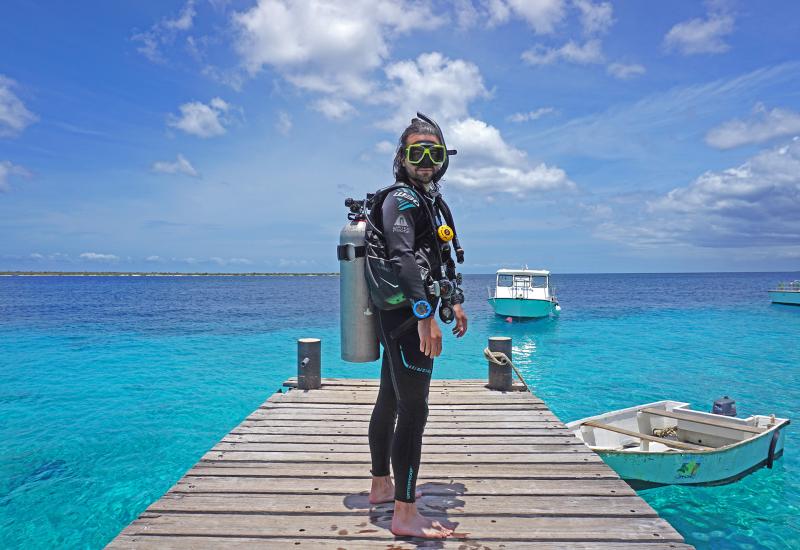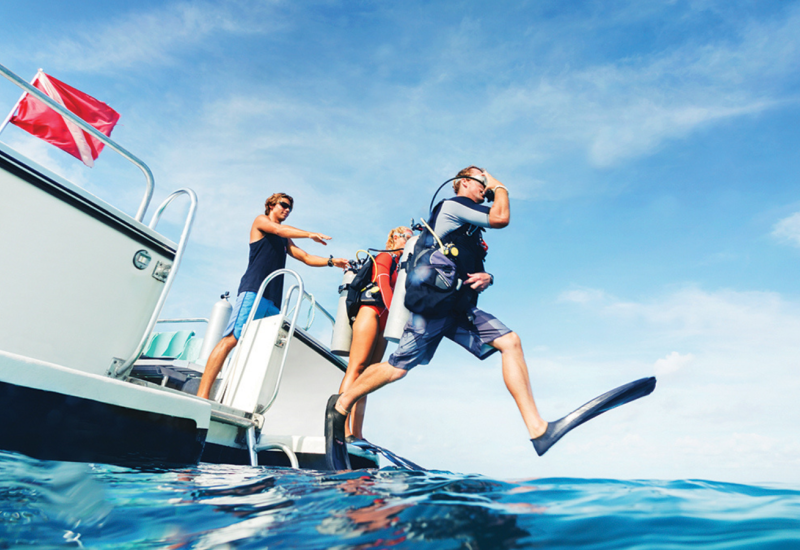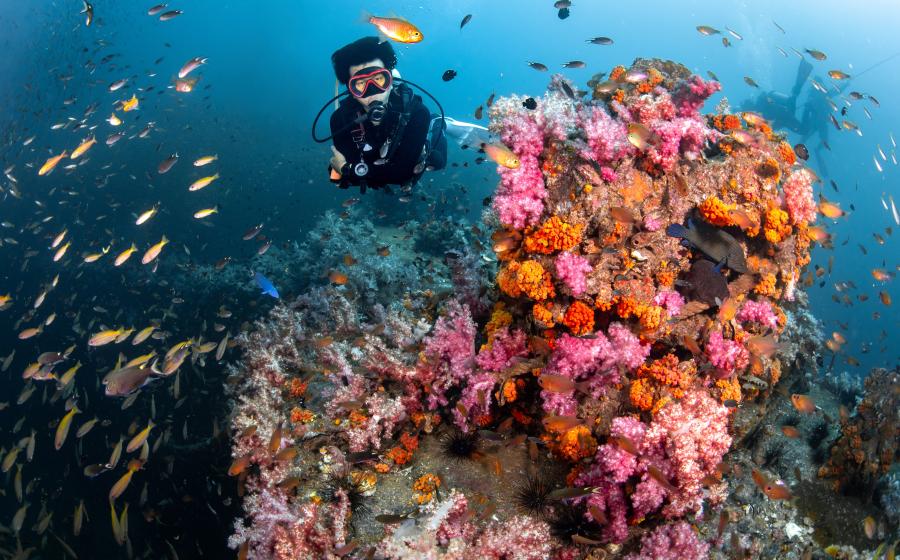Dive Training: End Ear Pain

Bill Story is a dive instructor right out of Central Casting. He's fit, knowledgeable, good-humored, and could dive four times a day trouble-free — that is until he had to teach a class. When helping students on a boat, Story couldn't even manage a second dive, his ears stubbornly refusing to clear, causing a painful squeeze that made it appear as though the good teacher couldn't practice what he preached.
After trying every trick he knew, he sought the advice of dive physician and ear, nose and throat specialist Murray Grossan, M.D., of the department of otolaryngology at Cedars Sinai Hospital of Los Angeles. Turns out the problem wasn't his ears at all. It was his nose--specifically all the pollution he was breathing during class dives, as he perched on the dive platform assisting students and sucking fumes.
"In technical terms, your eustachian tube function is directly dependent on mucociliary clearance, or your ability to clear the naturally occurring mucus from your airways," says Grossan. More simply, if your head is stuffed like a Christmas stocking, your ears will follow suit. Once Story avoided inhaling the boat fumes while the boat was idling, he was back in business, says Grossan.
That's the story of ear pain. It's common, annoying, and it can and does afflict even the most experienced divers.
The Big Squeeze
There are many causes of ear pain, but the most common culprit is "ear squeeze," the pain that occurs because of differences in pressure between the middle ear and the outside environment.
Like the inside of a primitive bongo, your middle ear is an air-filled space formed by bone and capped with a vibrating membrane, the eardrum. It connects to your throat through a flexible tunnel of muscle and cartilage called the eustachian tube. When the pressure of the outside world is different from that of the middle ear, such as when you're flying in a plane or scuba diving, the tunnel widens, allowing increased airflow through, which equalizes the pressure. As you drop deeper into the water, you assist this process by swallowing, yawning or gently pushing air through the tubes to equalize the pressure. If the eustachian tube fails to perform properly, or the pressure change happens more rapidly than the tube can adjust, the eardrum is pushed painfully inward, causing a "squeeze."
Descending through crushing ear squeeze is like overinflating a balloon; you can push only so far before something pops, and in this case it's your eardrum. At that point, the pain subsides and is replaced by dizziness, nausea and hearing loss as cold water streams into the middle ear. A ruptured eardrum generally heals well with some medical assistance, but it puts a serious damper on a diving trip, as you can't swim or dive until it is fully healed.
Occasionally, a diver who has trouble equalizing will emerge with a pressure-related injury known as barotrauma or barotitis, which causes lingering ear pain, fullness, dizziness or ringing in the ears. You also may get a buildup of fluid in the middle ear, causing uncomfortable ear fullness and hearing loss.
Ear pain and difficulty equalizing is often the result of respiratory problems, which means mucus buildup or swelling is blocking the tube from opening properly, says medical dive researcher Captain Marie Knafelc, M.D., Ph.D. "If you have a head cold or allergies, you'll need to properly deal with your congestion before you can clear," she says.
If ear pain is a problem for you, these clearing tips can help:
Avoid irritants. Cigarette smoke, boat fumes and exposure to allergens (like breathing recirculated air in a plane) can increase swelling and congestion around your eustachian tubes and make it difficult to clear. Try to breathe fresh, clean air just before a dive. If necessary, take a decongestant like Sudafed, but only if you have a history with the drug and know you tolerate it well.
Strive at five. Try to clear your ears about every five feet. If you get stuck, unable to clear at some point, go back up five feet and try again, suggests Grossan. "If you're at 15 feet and can't equalize, it means you have too much pressure on the eustachian tube opening. Ascending a few feet may relieve that pressure."
Let it build. Overaggressive ear clearing, that is, pushing air through too often, can not only stretch the eardrum, causing pain, but also can traumatize the eustachian tube, making it even harder to clear with each successive dive, says Knafelc. Novice divers are particularly prone to this problem because they're eager to clear right away. "Some people, especially those with narrow tubes, may find that they need to let a little pressure build so their ears feel 'full' and hearing is muted, before they can 'pop' them open," she says.
Easy does it. Closing your mouth, pinching your nose and gently blowing air into your mouth and nose can help open stubbornly blocked ears, but always be gentle, and never force it, warns Grossan. There are two small membranes called the oval and round windows that separate the middle from the inner ear. If you blow as hard as you can into your mouth and nose while trying to equalize, you risk blowing a hole in one of these windows, which can cause permanent hearing damage.
Go feet-first. "Your body is a big bag of liquid," says Grossan, "and when you dive head-first, gravity pulls fluid into your head, which accumulates in the eustachian tube opening and forces it shut. It's like standing on your feet too long; everything swells. Feet-first is better for ear clearing."
Stretch it out. Narrow eustachian tubes easily collapse on themselves under pressure. If equalizing is difficult, try tilting your head to the side first. This will stretch out, and hopefully open, the tube, says Knafelc.
Try a natural remedy. If too much mucus seems to be keeping you from clearing (and you don't have an upper respiratory infection), try a "home remedy" like hot tea to thin your mucus, so your body can clear it more easily. You can also try an over-the-counter remedy like Clear-Ease, which contains the fruit enzymes papain from papaya and bromelain from pineapple. These compounds have anti-inflammatory properties and may help thin mucus. For the best results, start taking it a couple of days before a dive.
Can You Hear Me Now?
If you're having lingering hearing loss, ringing in the ears or dizziness after a dive, see a doctor, and insist on an audiogram, a special hearing test to determine the root cause of the problem. "Too often, someone will see a doctor because they are having trouble hearing, and the physician sees that their eardrum is intact, meaning it's not ruptured, or that it's red, so they assume that nothing is really wrong or there's a simple infection," says ear, nose and throat specialist Murray Grossan, M.D. "That's dangerous because those symptoms may indicate perilymph fistula (PLF) or a blowout of the round window of the inner ear, one of the most serious complications of diving," says Grossan. "It's important that any PLF be diagnosed and treated in a timely manner because it can lead to permanent hearing damage."

Scuba DivingDo you have trouble equalizing your ears underwater? These 6 expert tips will help you clear your ears faster than you can say Valsalva maneuver.
Bill Story is a dive instructor right out of Central Casting. He's fit, knowledgeable, good-humored, and could dive four times a day trouble-free — that is until he had to teach a class. When helping students on a boat, Story couldn't even manage a second dive, his ears stubbornly refusing to clear, causing a painful squeeze that made it appear as though the good teacher couldn't practice what he preached.
After trying every trick he knew, he sought the advice of dive physician and ear, nose and throat specialist Murray Grossan, M.D., of the department of otolaryngology at Cedars Sinai Hospital of Los Angeles. Turns out the problem wasn't his ears at all. It was his nose--specifically all the pollution he was breathing during class dives, as he perched on the dive platform assisting students and sucking fumes.
"In technical terms, your eustachian tube function is directly dependent on mucociliary clearance, or your ability to clear the naturally occurring mucus from your airways," says Grossan. More simply, if your head is stuffed like a Christmas stocking, your ears will follow suit. Once Story avoided inhaling the boat fumes while the boat was idling, he was back in business, says Grossan.
That's the story of ear pain. It's common, annoying, and it can and does afflict even the most experienced divers.
The Big Squeeze
There are many causes of ear pain, but the most common culprit is "ear squeeze," the pain that occurs because of differences in pressure between the middle ear and the outside environment.
Like the inside of a primitive bongo, your middle ear is an air-filled space formed by bone and capped with a vibrating membrane, the eardrum. It connects to your throat through a flexible tunnel of muscle and cartilage called the eustachian tube. When the pressure of the outside world is different from that of the middle ear, such as when you're flying in a plane or scuba diving, the tunnel widens, allowing increased airflow through, which equalizes the pressure. As you drop deeper into the water, you assist this process by swallowing, yawning or gently pushing air through the tubes to equalize the pressure. If the eustachian tube fails to perform properly, or the pressure change happens more rapidly than the tube can adjust, the eardrum is pushed painfully inward, causing a "squeeze."
Descending through crushing ear squeeze is like overinflating a balloon; you can push only so far before something pops, and in this case it's your eardrum. At that point, the pain subsides and is replaced by dizziness, nausea and hearing loss as cold water streams into the middle ear. A ruptured eardrum generally heals well with some medical assistance, but it puts a serious damper on a diving trip, as you can't swim or dive until it is fully healed.
Occasionally, a diver who has trouble equalizing will emerge with a pressure-related injury known as barotrauma or barotitis, which causes lingering ear pain, fullness, dizziness or ringing in the ears. You also may get a buildup of fluid in the middle ear, causing uncomfortable ear fullness and hearing loss.
Ear pain and difficulty equalizing is often the result of respiratory problems, which means mucus buildup or swelling is blocking the tube from opening properly, says medical dive researcher Captain Marie Knafelc, M.D., Ph.D. "If you have a head cold or allergies, you'll need to properly deal with your congestion before you can clear," she says.
If ear pain is a problem for you, these clearing tips can help:
Avoid irritants. Cigarette smoke, boat fumes and exposure to allergens (like breathing recirculated air in a plane) can increase swelling and congestion around your eustachian tubes and make it difficult to clear. Try to breathe fresh, clean air just before a dive. If necessary, take a decongestant like Sudafed, but only if you have a history with the drug and know you tolerate it well.
Strive at five. Try to clear your ears about every five feet. If you get stuck, unable to clear at some point, go back up five feet and try again, suggests Grossan. "If you're at 15 feet and can't equalize, it means you have too much pressure on the eustachian tube opening. Ascending a few feet may relieve that pressure."
Let it build. Overaggressive ear clearing, that is, pushing air through too often, can not only stretch the eardrum, causing pain, but also can traumatize the eustachian tube, making it even harder to clear with each successive dive, says Knafelc. Novice divers are particularly prone to this problem because they're eager to clear right away. "Some people, especially those with narrow tubes, may find that they need to let a little pressure build so their ears feel 'full' and hearing is muted, before they can 'pop' them open," she says.
Easy does it. Closing your mouth, pinching your nose and gently blowing air into your mouth and nose can help open stubbornly blocked ears, but always be gentle, and never force it, warns Grossan. There are two small membranes called the oval and round windows that separate the middle from the inner ear. If you blow as hard as you can into your mouth and nose while trying to equalize, you risk blowing a hole in one of these windows, which can cause permanent hearing damage.
Go feet-first. "Your body is a big bag of liquid," says Grossan, "and when you dive head-first, gravity pulls fluid into your head, which accumulates in the eustachian tube opening and forces it shut. It's like standing on your feet too long; everything swells. Feet-first is better for ear clearing."
Stretch it out. Narrow eustachian tubes easily collapse on themselves under pressure. If equalizing is difficult, try tilting your head to the side first. This will stretch out, and hopefully open, the tube, says Knafelc.
Try a natural remedy. If too much mucus seems to be keeping you from clearing (and you don't have an upper respiratory infection), try a "home remedy" like hot tea to thin your mucus, so your body can clear it more easily. You can also try an over-the-counter remedy like Clear-Ease, which contains the fruit enzymes papain from papaya and bromelain from pineapple. These compounds have anti-inflammatory properties and may help thin mucus. For the best results, start taking it a couple of days before a dive.
Can You Hear Me Now?
If you're having lingering hearing loss, ringing in the ears or dizziness after a dive, see a doctor, and insist on an audiogram, a special hearing test to determine the root cause of the problem. "Too often, someone will see a doctor because they are having trouble hearing, and the physician sees that their eardrum is intact, meaning it's not ruptured, or that it's red, so they assume that nothing is really wrong or there's a simple infection," says ear, nose and throat specialist Murray Grossan, M.D. "That's dangerous because those symptoms may indicate perilymph fistula (PLF) or a blowout of the round window of the inner ear, one of the most serious complications of diving," says Grossan. "It's important that any PLF be diagnosed and treated in a timely manner because it can lead to permanent hearing damage."










